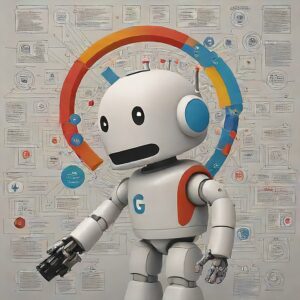Deprecated: mb_convert_encoding(): Handling HTML entities via mbstring is deprecated; use htmlspecialchars, htmlentities, or mb_encode_numericentity/mb_decode_numericentity instead in /home/u367103043/domains/aisourcehub.com/public_html/wp-content/plugins/taxopress-pro/inc/class.client.autolinks.php on line 329
Deprecated: mb_convert_encoding(): Handling HTML entities via mbstring is deprecated; use htmlspecialchars, htmlentities, or mb_encode_numericentity/mb_decode_numericentity instead in /home/u367103043/domains/aisourcehub.com/public_html/wp-content/plugins/taxopress-pro/inc/class.client.autolinks.php on line 329

As businesses increasingly incorporate artificial intelligence (AI) into their PPC campaigns, evaluating the impact of these technologies becomes paramount. AI promises to revolutionize PPC management through automation, advanced analytics, and improved targeting. However, understanding how to measure and assess the effectiveness of AI within your PPC strategies is crucial for maximizing return on investment (ROI) and making informed decisions about future ad spend. This blog post provides a comprehensive guide on how to evaluate the performance of AI-driven PPC tools, identify the best metrics for assessment, and navigate the challenges associated with AI adoption.
How to Evaluate the Performance of AI-Driven PPC Tools
Evaluating the performance of AI-driven PPC tools involves several key steps:
-
Set Clear Objectives: Before you can measure success, you need to define what success looks like for your campaigns. This might include increased conversions, lower cost per acquisition (CPA), or improved return on ad spend (ROAS).
-
Benchmark Pre-AI Performance: To truly understand AI’s impact, you need a baseline of your PPC campaign’s performance before AI integration. This involves collecting data on key metrics such as click-through rate (CTR), conversion rate, and overall campaign costs.
-
Implement AI Tools Strategically: Introduce AI tools into your PPC campaigns in a controlled manner, allowing for isolated testing of AI’s effectiveness against your objectives.
-
Monitor Performance Metrics: Use analytics platforms to track the performance of your AI-enhanced campaigns. Key metrics to watch include CTR, conversion rate, CPA, and ROAS.
-
Compare Against Benchmarks: Evaluate the performance of AI-driven campaigns against your pre-AI benchmarks to assess the tangible impact of AI on your PPC efforts.
When to Assess the Performance of AI in PPC Campaigns
Timing is everything when it comes to evaluating AI’s impact. Consider assessing AI’s performance:
- After an Initial Learning Period: AI systems often require a learning phase to analyze data and optimize performance. Allow sufficient time for this process before making any evaluations.
- During Peak business Periods: Evaluate AI’s effectiveness during your business’s peak periods to understand how well it can scale and manage increased traffic and conversions.
- After Significant Changes: If you’ve made major changes to your PPC strategy or AI configuration, reassess performance to gauge the impact of these adjustments.
Measuring the Impact of AI on PPC Campaign Performance
Success in PPC campaigns can be measured through a variety of metrics, but when assessing AI’s impact, focus on:
- Improved Efficiency: Look for reductions in manual labor and time spent managing campaigns.
- Increased Campaign Performance: Assess improvements in CTR, conversion rates, and overall ROAS.
- Cost Savings: Determine if AI has helped lower CPA and maximized your ad budget.
Main Challenges of Using AI for PPC Optimization
While AI offers significant advantages, businesses may encounter challenges such as:
- Integration Complexities: Incorporating AI into existing PPC management processes can be technically challenging.
- Data Privacy Concerns: Using AI requires careful handling of user data to comply with privacy regulations.
- Skill Gaps: Successfully leveraging AI tools may require new skills or training for your marketing team.
Why Some Businesses Hesitate to Adopt AI in PPC
Despite its benefits, some businesses remain hesitant to adopt AI due to:
- Perceived Cost: Concerns about the upfront investment in AI technology can deter businesses.
- Uncertainty About ROI: Skepticism about whether AI will deliver on its promises can cause reluctance.
- Complexity and Learning Curve: The perceived complexity of AI tools and the required learning curve can be daunting for some businesses.
Conclusion
Evaluating the impact of AI on PPC campaign performance is essential for businesses looking to leverage AI technologies effectively. By setting clear objectives, closely monitoring key performance metrics, and understanding the timing and challenges associated with AI integration, businesses can make informed decisions that enhance their PPC strategies and overall digital marketing success. As AI continues to evolve, staying informed and adaptable will be key to maximizing its potential in PPC campaign management.
Remember, the journey to integrating AI into your PPC campaigns is a continuous process of learning, testing, and optimization. Embracing AI with a strategic approach will enable you to unlock new levels of efficiency and campaign performance.

